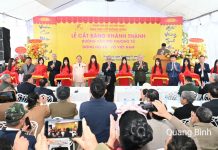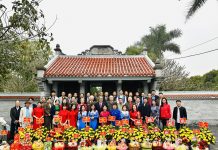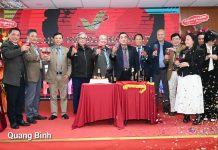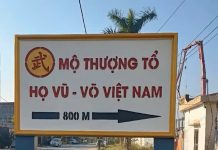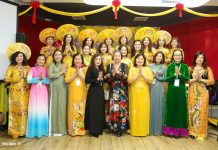In Vietnam, the clan is an important social structure that directly contributes to the formation of villages as a fundamental societal unit and, on a broader scale, to the nation itself. Vietnamese clans have grown alongside the country, closely tied to the history of the nation’s formation and development, always accompanying the people in their efforts to conquer nature, build, and defend the homeland.
The Clan Council is an organization that gathers individuals of the same clan, functioning as a voluntary association of the Clan in Vietnam. It provides direction for clan activities based on consensus and unity, encouraging mutual support in work and life while preserving and promoting the clan’s honorable traditions.
The Vu – Vo Clan Council of Vietnam was founded upon this philosophy. However, throughout its history, it has also experienced periods of ups and downs.
According to historical records, the entire southern region of the Yangtze River was once inhabited by non-Han ethnic groups collectively known as the Bach Viet. Some branches of these people established their own nations, such as the Lac Viet, Au Viet, Dien Viet, Man Viet, etc..
By the 8th century, after the ancient state of Au Lac had been annexed into An Nam Protectorate, the Vu Clan in the Man Viet region was well known for its benevolence, with generations of scholars and virtuous officials. One such figure, Vu Cong Huy, served in the Duong Dynasty’s government before retiring to his homeland. During a journey exploring the southern lands, he arrived in Hong Chau (present-day Hai Duong Province). There, he discovered a mound with auspicious geomantic properties, believed to bring prosperity in scholarship and virtue to future generations. He decided to relocate the remains of his father, Vu Tien Oanh, for burial at Dong Dom. In Hong Chau, he married a local woman named Nguyen Thi Duc. From this union between the talented Man Viet scholar and the virtuous woman of Man Nhue Village, Hong Chau, a son was born on the 8th day of the first lunar month in the year of Giap Than (804). This son, possessing an extraordinary intellect, was named Vu Hon.
Fulfilling his father’s aspirations, Vu Hon passed the imperial examination at the age of 16, earning the title of Doctor. Five years later, he was appointed Governor of Giao Chau, overseeing an administrative unit with eight districts. In 841, at the age of 37, he was promoted to An Nam Military Commissioner, governing 13 provinces with 59 districts, encompassing Southwestern Guangxi (China), and all of northern and central Vietnam up to Ha Tinh.
Despite his scholarly achievements and rapid political ascent, Vu Hon is most remembered for his filial piety, compassion, and dedication to educating the people. At the age of 39, he resigned from his official duties to teach. He settled in Cham Thuong Village, where he attracted followers and established Kha Mo Settlement (present-day Mo Trach Village, Tan Hong Commune, Binh Giang District, Hai Duong Province).

Panoramic view of the Ancestral Tomb at Dong Dom.
After his passing on the 3rd day of the twelfth lunar month in 853, the people of Kha Mo, grateful for his contributions, venerated him as their deity. The imperial court later conferred upon him the title of Supreme Deity of Blessings. Vu Hon is regarded as the Ancestral Founder of the Vu – Vo Clan of Vietnam and the deity of Mo Trach Village. Over the centuries, from the Tran Dynasty to the Nguyen Dynasty, he was honored with numerous imperial decrees recognizing him as a Supreme Deity.
The Vu – Vo surname originates from the same Chinese character (武) but was pronounced differently due to a naming taboo under the Nguyen Lords in southern Vietnam. For over 1,200 years, despite historical fluctuations, generations of the Vu – Vo Clan of Vietnam have upheld traditions of patriotism, filial devotion, moral cultivation, academic excellence, and societal contributions.
From Mo Trach Village, the birthplace of the Vu – Vo Clan in Vietnam, descendants of the Vu – Vo lineage have spread in all directions. In 1990, several individuals of the Vu family originating from Mo Trach Village gathered, exchanged ideas, and jointly established the Hanoi Vu Family Liaison Committee with the purpose of collecting documents on Mo Trach Village, Ancestral Founder Vu Hon, and the “Five Branches – Eight Sects.” Over five years (1990-1995), the Hanoi Vu Family Liaison Committee expanded its organization and connections, leading to the formation of the “Vu – Vo Family Liaison Committee” with the support and participation of Vu – Vo clanspeople from various provinces and cities.

Leaders of the Vu – Vo Clan Council of Vietnam and provincial councils attend the incense-offering ceremony at Mo Trach Village, Tan Hong Commune, Binh Giang District, Hai Duong Province.
Along with the formation and development of the Vu – Vo Clan Liaison Committee, from 1994 to 2003, Vu – Vo Clan Liaison Committees were also established in several provinces and cities. At that time, these provincial and municipal committees proposed the need for a unified national liaison committee. As a result, on June 14, 2003, the committee was officially named the Vu – Vo Clan Liaison Committee of Vietnam. On September 9, 2006, it was renamed the Vu – Vo Clan Council of Vietnam.
Alongside the development of the Vu – Vo Clan Councils in provinces and centrally governed cities, efforts have also been made to establish Vu – Vo Clan Councils or Liaison Committees abroad. To date, Vu – Vo Clan Councils have been established in 51 provinces and cities across the country. Additionally, five Vu – Vo Clan Councils and Liaison Committees have been formed overseas.
The activities of the Vu – Vo Clan Council are built upon two core values: Kindness and Wisdom, operating on a voluntary basis and guided by the principle of consensus. While respecting the autonomy and self-governance of local clan councils, the Vu – Vo Clan Councils at all levels serve as the nucleus and unifying force, playing a guiding, connecting, and directive role in achieving common goals to ensure cohesion in action. Adhering to its principles, objectives, and operational guidelines, the Vu – Vo Clan Council of Vietnam has achieved remarkable accomplishments.
Over more than 30 years, from the establishment of the Vu Liaison Committee in Hanoi to the present-day Vu – Vo Clan Council of Vietnam, the council has made significant progress, attaining notable achievements while also facing various challenges. As a result, the activities of the Vu – Vo Clan Council of Vietnam still encounter many difficulties, necessitating continuous innovation and improvement.
Major General of the People’s Public Security Vu Dinh Thuat
Vice President of the Vu-Vo Clan Council of Vietnam, President of the Vu-Vo Clan Council of Hai Duong Province







